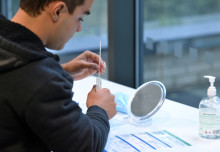
Sarah Brown

IGHI welcomed maternal and child health campaigner, Sarah Brown, as an Adjunct Professor at an event last month.
Sarah Brown is founder and president of the charity PiggyBankKids and Global Patron of the White Ribbon Alliance for Safe Motherhood where she has been a leading voice in the global maternal mortality campaign. At the event, Sarah spoke about the need to have a lateral approach to health systems to allow for cross-over and collaboration between different sectors to improve health outcomes for mothers. She also spoke about her role as an advocacy campaigner where a huge amount of effort has been poured into unlocking the global political will necessary to making a real difference on the ground to the lives of mothers and children.
Guests at the event also heard presentations from three leading Imperial academics working in the field of maternal and child health:
Michael Levin, Professor of Pediatrics and International Child Health and Director of the Wellcome Centre for Clinical Tropical Medicine, presented research conducted by the Imperial College paediatric research group on life threatening childhood infections. Professor Levin highlighted a paper published in the journal New England Journal of Medicine which examined mortality rates in children who were given fluids during resuscitation. The study found that the standard practice of administering fluids to patients in wealthy countries actually increased mortality in critically ill children in resource-limited settings in Africa. Professor Levin used this paper to stress the need for evidence-based medicine so that all interventions improve health outcomes for patients regardless to their location.
Professor Lesley Regan, based in the department of surgery and cancer at Imperial, spoke about her research on the causes of miscarriage - the commonest complication of pregnancy. During her presentation, Professor Regan emphasised the need for early intervention to improve pregnancy outcomes and highlighted a unique collaboration with Professor Gudrun Moore at University College London called the Baby Bio Bank. For the first time, medical history and blood samples will be taken from both parents, together with cord blood and placenta samples after the baby is born. The research project will collect a tissue archive of thousands of trio samples (from the mother, father, and fetus/baby) in order to identify candidate genes for the four major complications of pregnancy – recurrent miscarriage, preterm birth, fetal growth restriction and pre-eclampsia. It will take 5 years to complete the sample collection which will then be made available to other researchers in the UK to facilitate their studies into these pregnancy complications.
The final presentation came from Professor Alan Fenwick who directs the Schistosomiasis Control Initiative (SCI) in the Department of Infectious Disease Epidemiology at the College. SCI is dedicated to eliminating a group of parasitic diseases collectively known as neglected tropical diseases (NTDs) and is one of the top two international charities recommended by www.givewell.org in the USA. Schistosomiasis (Bilharzia) is caused by trematode worms which live in the blood vessels around the bladder or the intestine. More than 200 million people in developing countries, 85% of them in sub-Saharan Africa, are affected by the disease. However, SCI is committed to deliver over 100 million treatments to children over the next 4 years at a cost of less than 50 pence per child per year. Professor Fenwick underlined a number of factors that must be addressed in order to upscale delivery of treatments to country-level, including mobilising political will; developing a national plan with strategies at each district level and delivering the drugs on a local level.
Reflecting on the event, Lord Darzi said:
“Although we have made significant progress on Millennium Development Goals 4 and 5, it’s unlikely we’re going to meet the target of reducing mortality rate for under 5’s by two thirds and reducing maternal mortality by 75% by 2015. Efforts to achieve these targets not only need to increase but require a multidisciplinary approach that involves academics, clinicians and campaigners across different sectors to collaborate and address health inequalities around the world. It’s in this spirit that we’re delighted to announce that Sarah Brown has been appointed as an adjunct professor at IGHI. Sarah is a passionate advocate for women’s health and global education issues around the world and will be a valuable addition to the Institute.”
Commenting on the appointment, Sarah Brown said:
“I’m very pleased to play a role at the Institute to support its focus on global health, especially as the 2015 deadline approaches for the Millennium Development Goals. I am looking forward to seeing the Institute play a great role in bringing together multi-sector representatives to seek better global health solutions, and to drawing on the vast expertise and academic excellence that Imperial College can offer to benefit mothers and children worldwide."
Article text (excluding photos or graphics) available under an Attribution-NonCommercial-ShareAlike Creative Commons license.
Photos and graphics subject to third party copyright used with permission or © Imperial College London.





